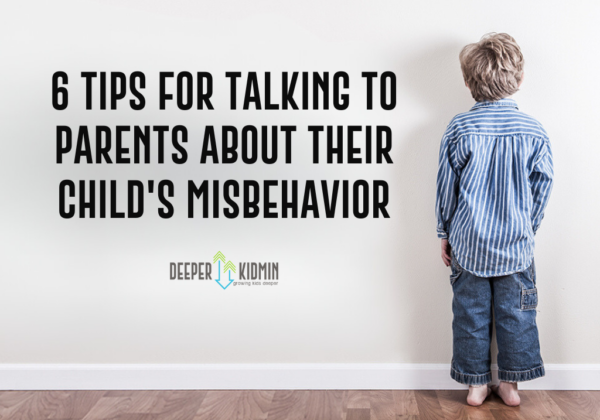
Are all the kids in your ministry perfect angels who sit quietly for the lesson and immediately obey any instructions? No, doesn’t like your Sunday morning? You’re not alone. (And honestly, if you did have perfectly behaved children 100% of the time, I’d think something was wrong.) We all have behavior issues that arise in our ministries, especially as we enter back-to-school season and return to routines after the summer. If you haven’t yet, at some point you’ll have to talk with parents about a child’s misbehavior. That can be an intimidating and uncomfortable task, but you don’t have to go in unprepared. Check out this guest blog post from David Rausch, creator of Go! Curriculum and a DKM Vendor, with 6 tips for talking with parents about their child’s misbehavior:
“Yay! I get to tell a parent about their child’s misbehavior,” said no one ever. Let’s be honest, when you signed up to be a KidMin leader, you probably didn’t imagine yourself with a bead of sweat rolling down your forehead as you broke the news to a parent that their child flew off the rails… again. Or that their child karate chopped your object lesson in half… again. Or that their child is the one who puts the tears in “volun-tears.” (I know… creative spelling on that last one.) But here you are. Or here you have been. Or here you will be if given enough time. Challenging behavior is inevitable and when it happens to a degree that warrants a conversation with parents, you need to be ready.
So let’s get ready! Here are 6 tips on how to have this conversation with parents.
- Talk to the parents in private. We have to remember that parents are no more excited to hear that their child has been disruptive than we are to tell them. In fact, it can be a source of embarrassment for parents, so pull them aside where you can talk privately.
- View the parents as teammates. In fact, not only are they your teammate, they are the much more qualified teammate when it comes to understanding their child’s behavior and determining solutions. They know their child far better than you or anyone else, so lean on them for advice. (Maybe even consider working with the parents to create an Individualized Church Behavior Plan for their child.)
- Ask the parents for more context. Bad behavior is communication. Many kids (especially younger ones) don’t have the ability to verbally express anxiety, hurt, or frustration, so they channel those emotions through negative behavior. When a child misbehaves, they’re telling you something with their actions. Maybe they’re bored. Maybe they’re confused. Maybe their dad has been gone on business a lot lately. Maybe they’re getting bullied at school. Ask the parents if they know of any major events at home or school that might contribute to their child’s challenging behavior.
- Serve the parents a “compliment sandwich.” You’ve probably heard of the “compliment sandwich” before. It’s when you start and finish with a positive (that’s the bread), and you slip the negative in the middle (that’s the meat). Begin by telling the parents how their child has been an asset to the room. Transition to the “meat” by saying something like, “Lately, though, there’s been some challenging behavior.” Without sugar-coating the behavior, speak to them in love about the specifics of the challenge and ask them for their thoughts. In the end, wrap the conversation up with a sense of hope. Say something like, “I can’t wait to see Alex next Sunday. On good weeks, he brings so much positive energy to the room. I know he can do that even more!”
- Ask the parents how you can pray for them. This is a great way of reminding both yourself and the parent that you’re not just a team of two, but of three. Ultimately, it’s the Holy Spirit who changes hearts and guides us towards right behavior. It’s also a great way of getting parents to further open up about difficulties that might be contributing to their child’s behavior.
- Give the parents updates in the following weeks. If the child’s behavior has changed for the better, let the parents know that. It could be as simple as a thumbs up. If there’s still work to be done, let them know that too. Either way, the follow-up shows parents that you care and are committed to discipling their child through the challenge.
Want to implement a behavior management system that helps prevent these types of conversations with parents and the misbehavior that causes them? Check out our SLLRP lesson to get started!
Looking for other Back-to-School resources to help your kids and families have a great year? Explore all Back to School resources here!
Author Bio: David Rausch has been in children’s ministry for over 20 years. He is the creator of GO! Curriculum. His passion is for resourcing and training people to plant the Word of God in the hearts of children. You can find KidMin related articles from David at www.imdavidrausch.com.

Leave a comment
You must be logged in to post a comment.